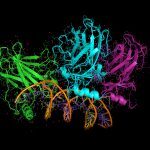Lien vers Pubmed [PMID] – 29207682
Lien DOI – 10.18632/oncotarget.19433
Oncotarget 2017 Oct; 8(53): 91734-91764
The high molecular heterogeneity of bladder tumours is responsible for significant variations in disease course, as well as elevated recurrence and progression rates, thereby hampering the introduction of more effective targeted therapeutics. The implementation of precision oncology settings supported by robust molecular models for individualization of patient management is warranted. This effort requires a comprehensive integration of large sets of panomics data that is yet to be fully achieved. Contributing to this goal, over 40 years of bladder cancer glycobiology have disclosed a plethora of cancer-specific glycans and glycoconjugates (glycoproteins, glycolipids, proteoglycans) accompanying disease progressions and dissemination. This review comprehensively addresses the main structural findings in the field and consequent biological and clinical implications. Given the cell surface and secreted nature of these molecules, we further discuss their potential for non-invasive detection and therapeutic development. Moreover, we highlight novel mass-spectrometry-based high-throughput analytical and bioinformatics tools to interrogate the glycome in the postgenomic era. Ultimately, we outline a roadmap to guide future developments in glycomics envisaging clinical implementation.

